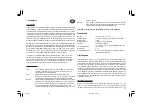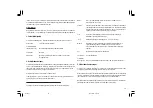
22
1. Description
1.1 Control unit
The soldering station was specially developed for soldering tasks with an extremely high
heat requirement. The 150 W heater power combined with the optimal transfer of heat to the
soldering iron bit guarantees the high performance capability of the WSP 150 soldering iron.
As an alternative to the WSP 150, all the soldering tools listed in the list of accessories can be
connected to the unit. A microprocessor makes operation simple and comfortable. The digi-
tal electronic control system guarantees the best possible control performance for various
soldering tools. The soldering tools themselves are recognized automatically by the soldering
station and assigned the corresponding control parameters. The high-powered 24 V heating
elements make excellent dynamic performance possible, so that the soldering tools can be
used universally.
Various equipotential bonding possibilities for the soldering iron tip, zero power switch and
antistatic design of control unit and iron complete the high quality standard. The possibility
of connecting an external input unit further increases the variety of functions of this soldering
station. With the optional input units WCB 1 and WCB 2 it is possible to implement time
functions, locking functions, etc. Integrated temperature gauge and PC interface are included
in the extended scope of the input unit WCB 2.
The temperature for the WSP 150 soldering iron can be set over the range from 50 ºC - 550
ºC via 2 buttons (Up/Down). The adjustment range is automatically limited to 450 ºC if a
different soldering tool is connected. The setpoint and actual value are displayed digitally. A
blinking red LED in the display signals that the preset temperature has been reached – this
serves as a optical regulator. Constant illumination means that the system is overheating.
1.2 Soldering irons
LR 21:
Our "standard” soldering iron. With a power of 50 watts and a wide spectrum
of soldering tips (ET series) this soldering iron can be used anywhere in the
electronics sector.
LR 82:
High-performance 80 watt soldering iron for soldering work with high heat
requirements. The soldering tip is attached by a bayonet catch to ensure
correct position when using different tips.
WSP 80:
The soldering iron WSP 80 is characterized by its capacity for reaching the
soldering temperature quickly and precisely. Its slim design and heating
power of 80 watts makes universal usage possible - from extremely fine to
high-temperature soldering work. Work can be continued immediately after
switching soldering tips, since the temperature is reached again quickly.
WSP 150:
Special 150 W soldering iron for soldering tasks with an extremely high heat
requirement. Easy to use shape combined with high performance capability.
Fast warm-up time and precise temperature regulation characterise the
soldering irons in this power range.
See "Accessories" for additional tools.
Technical Data
Dimensions in mm:
166 x 115 x 101 (l x w x h)
Supply voltage (7):
230 V / 50 Hz (240 V / 60 Hz dual version)
Power input:
160 W
Class:
1 (control unit) and 3 (soldering iron)
Fuse (8):
230 V / 50 Hz; T800mA
115 V / 60 Hz; T1,6A
Temp. control:
50 °C - 550 °C (only WSP 150)
Precision:
± 11°C
Equipotential bonding (10):
Via a 3.5 mm jack bush on the back of unit (initial state -
hard-grounded)
2. Starting
Assemble soldering iron rest (see exploded drawing).Place the soldering iron in the safety
rest. Insert the soldering iron plug into the connection bush (6) of the control unit and lock by
turning to the right. Check that the power supply corresponds to the specifications on the
name plate and that the power switch (1) is in the OFF position. On version that can be
switched, set the voltage on the selection switch (set in the factory to 240 V). On version that
can be switched, set the voltage on switch (8) and insert the appropriate fuse (7). Connect
the control unit to the power supply. Switch on the unit at the power switch (1). When switching
on the unit, a self-test is carried out in which all display elements (2) are switched on briefly.
The electronic system then switches automatically to the set temperature and displays this
value. Constant illumination means that the system is overheating. The blinking light signals
that the operating temperature has been reached.
GB
WSD150
04.04.2002, 9:12 Uhr
22











































